Man has been defined as a gregarious animal, but in his highly civilised condition he is gregarious only to a limited extent.
He loves the society of his kind it is true, but then it must be such society as he fully approves.
He has often little sympathy for those members of the human family who do not move in the rut in which his existence is cast.
He looks down with contempt upon those who are poorer than himself, and devotes a considerable portion of his time to the task of getting into a clique a degree above him in the social scale.
The human family, in these latitudes at least, is indeed cut up into sections which are as sharply defined as the arbitrary distinctions of the Hindoo.
We have discarded “caste” and the “tribe,” and have substituted the clique as the most reasonable method of sub-dividing the human family.
Tribal or caste distinctions might be difficult to maintain in a country like ours where so many persons are ignorant that they ever had great grandfathers; but the clique fulfils all the exclusive demands of the British snob with-out taxing too severely his power of inventing a pedigree.
We can enter a clique readily enough provided we can prove to the satisfaction of the members of it that we possess the necessary littleness of mind, and the other trifling distinctions which are demanded by the rules of the Fraternity.
The clique literary, for example, is usually composed of second-rate journalists, and authors who have formed themselves into a mutual admiration society for the sake of puffing each other’s work.
To become a member of this mysterious circle you must spend many years in a condition of probation.
Your best articles will be rejected by the members as beneath their notice, and your novels will be “jumped upon” in the literary reviews.
But when you have reached the condition of a literary hack, and can write nothing that possesses originality or merit, the members of the little coterie will welcome you to their circle with open demonstrations of good will.
You have become one of themselves, you have graduated into the condition of a mere dealer in platitude.
The rich strata of mental treasure, which was in your brain has been worked out, and you are at last regarded as an equal by men who never in their lives were able to juggle two ideas together in their own feeble heads.
We could point to periodicals once powerful, which, having passed into the hands of these people, have become mere vehicles for the display of the imbecility and the folly of creatures who were not worthy to lose the shoestrings of the men they have succeeded.
Again, there is the clique scientific, represented by persons like the tailor in Gulliver’s Travels, who took the measure of a customer with a quadrant.
These people talk a detestable jargon, compounded of Greek and English in equal proportions.
Their leading idea is that science should be made mysterious to the vulgar, and with that laudable end in view they veil simple things under a cloud of words.
In the jargon of the clique of geologists, for example, the great fossil lizard becomes the Ichthyosaurus or fish reptile.
The fossil tapir becomes the Palceotheriumor ancient wild beast; another monster is the Megatherium or great wild beast.
But these names are mere trifles; such words as Megalomix and Scelidothmum have been applied by these worthies to distinguished allied species, and we are required to believe that these “jaw breakers,” as the Scotch would call them, are all necessary for the elucidation of simple scientific facts.
The truth is, that without the assistance of a veil of words the geologists would soon find their preserves invaded by persons with whom the clique would not care to associate.
The man who can call a fossil tapir Palceotherium, and who can dub the study of fossils with the title of palaeontology imagines he has achieved a victory over the vulgar, and no doubt he has.
That there are medical cliques every person knows who has had occasion to consult a physician.
The member of the medical clique feels your pulse, looks at your tongue, and scrawls his prescription in a jargon as nearly like the gibberish with which schoolboys amuse themselves, as anything of such serious import can well be.
But the “dog Latin” of his prescription is innocent compared with, the outrageous rubbish, in the shape of coined words, with which the medical journals are filled.
The members of the medical clique cannot describe so simple a thing as the amputation of a limb, or the cure of an enlarged artery without the’ use of words which belong to no language that ever existed.
The jargon is used to warn off intruders from the sacred preserves of the clique, and’ it no doubt effectually serves its purpose.
Then we have the clique composed of the rich and vulgar, who require ample proof that your balance at the banker’s is satisfactory before they will deign to countenance you.
You might be a Milton or a Shakespeare for aught they know or care.
The treasures of the mind are nothing in their estimation, and men are classified by their money bags, and scorned or venerated accordingly.
These people exist merely to display their wealth.
Their houses are filled to overflowing with art treasures, and the art trumpery which is now so fashionable.
The members of the clique regularly attend Christie and Hanson’s sales, and squabble and outbid each other over a celebrated daub, merely for the fame which will accrue to them from the purchase of a ” masterpiece ” at a fabulous price.
Snob-son glories in being pointed out as the man who gave £20,000 for a piece of blackened canvas, upon which scarcely any traces of the pencil of the painter remain.
He flings away his money upon crockery, because it is fashionable to do so, but, in his heart of hearts, he thinks the drop scene at the Gaiety a finer picture than any Claude in his gallery; and his cut glass decanters he secretly holds are superior to the Portland vase.
He pretends to love art because it is the fashion, but he knows no more about it than a savage, and satisfies himself for his extravagance by dreaming of the fame which will accrue to him when his collection comes to the hammer.
Such are some few of the cliques into which our complex society has become divided.
We might particularise others, but we weary of the task.
The world is, indeed, composed of cliques.
What, indeed, is a nation but a clique on a gigantic scale, and Masonry, were it not for the breadth of the principles which it teaches, might almost be regarded as a clique of mystery men, banded together for the purpose of indulging in the universal weakness for the outré and the marvellous.
 The Freemasons Chronicle, a weekly record of masonic intelligence, was first published 2nd January 1875 London, England as an independent weekly journal of masonic interest and continued for 27 years.
The Freemasons Chronicle, a weekly record of masonic intelligence, was first published 2nd January 1875 London, England as an independent weekly journal of masonic interest and continued for 27 years.
It should be the business of a journal devoted to the interests of the Order to attempt the removal of prejudices such as these, which, though they may have little perceptible influence upon the prosperity of the Fraternity, yet have the effect of preventing timid or ill-informed persons from enlisting under its banner.
It will not only attempt to keep pace with the growing literary requirements of the day, but it will seek to exhibit the Order to the non-Masonic world divested of its technical details, and clothed in the garb of Charity and Brotherly Love.
The questions of the hour, which exercise the minds of thoughtful men, will be handled freely and broadly, without any tinge of political or sectarian bias.
The memoranda of Masonic gatherings which will appear from week to week, will be full and accurate; and as free interchange of opinion is one of the best signs of life and vigour in any society, ample scope will be given for Correspondence on topics of interest to the Order.
If we may venture upon a new rendering of words which recent events have made memorable, we will say here, once and for all, that we will be keen men of business, and will spare no effort, consistent with honour, to achieve commercial success; but first, and before all things, we will prove to our brethren and the world that we are FREEMASONS.
Recent Articles: The Freemason's Chronicle
 Operative And Speculative Masonry Explore the fascinating transition from Operative to Speculative Masonry in our latest post. Discover historical insights from Augustus C. L. Arnold and Rev. Wm. P. Strickland, shedding light on Freemasonry's evolution and its enduring principles. Dive into the rich history and significant milestones that shaped modern Freemasonry. - The Freemason's Chronicle - 2 September 1876 |
 Discover the true essence of Freemasonry, an ancient order founded on the profound principles of love for God and man. It's a call to rise above mere appearances, to embody genuine virtue and benevolence, transcending societal pretense. Embrace the transformative power of simplicity, and let the authentic glories of Freemasonry inspire your path. |
 Discover the intriguing story of a man who became a Mason but openly professed his dislike for the institution. Unravel the peculiar circumstances that led him down this path and explore the unexpected consequences that followed. Dive into this thought-provoking account that challenges our notions of loyalty and reveals the complexities of human nature within the Masonic fraternity. |
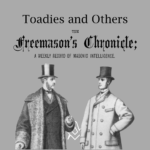 In the realm of Masonry, the principles of equality and respect are paramount. Yet, the presence of toadies—those who obsequiously seek favour from the influential—threatens these ideals. While Masonry embraces diverse beliefs and backgrounds, it rejects the sycophantic behaviours of toadies, flunkeys, and tuft-hunters, urging members to uphold genuine respect and self-worth. The Freemason's Chronicle - 22nd January 1876 |
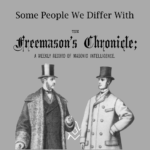 Unveiling the Unpleasant: Some People We Differ With Discover the intriguing dynamics of quarrels within the Masonic brotherhood. From the cantankerous to the litigious, the peevish to the vengeful, delve into the characters that challenge fraternal harmony. Explore their motives, temperaments, and the art of navigating disputes with these fascinating brethren. Brace yourself for a riveting journey into the world of conflicting personalities. |
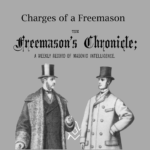 Unravelling the Masonic Mystique: A Deep Dive into the Freemasons' Charges - Explore the intricate world of Freemasonry, its principles, rituals, and the mechanisms for resolving internal disputes. Discover how this ancient fraternity fosters unity, promotes moral conduct, and upholds the sanctity of its secrets, while navigating the complexities of modern society. - The Freemason's Chronicle - 4 December 1875 |
 Unlock the hidden lessons of Masonic Studies! Don't settle for superficial knowledge or mere rituals. Discover the true depth and meaning behind Freemasonry. Expand your understanding of Tracing-Boards, Lectures, and more. Join regular Lodges of Instruction to enhance your Masonic journey. Become a knowledgeable Freemason, not just a token-bearer. Unleash the power of true Masonic wisdom today! |
 Uncover the incredible story of how Masonry saved the life of a Crimean War foot soldier in this historical and masonic account. Through the first hand experience of a soldier engaged in fierce hand-to-hand combat, witness the fateful encounter with a Russian Freemason that changed the course of his life. Learn how brotherhood and a deep dedication to the craft can lead to unforeseen and life-saving circumstances on the battlefield. |
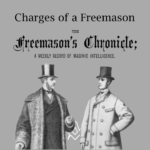 The Freemason's Chronicle - Charges of a Freemason The secrets of Masonry are the exclusive property of the Craft, and can never be communicated to one who is a mere labourer and not an accepted Mason. Hence, no labourer, that is, one who has not been regularly initiated in a legal Lodge. Article first published in The Freemason's Chronicle, 27 November 1875 |
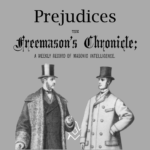 The Freemason's Chronicle - Prejudices Prejudices are partial judgments in favour of, or against certain persons or things, and, for convenience sake, may be ranged in two categories—those which are, comparatively speaking, harmless, and those which are harmful. Article first published in The Freemason's Chronicle, Oct. 2 1875. |
 The Freemason's Chronicle - Cliques Is Freemasonry - a Clique ? Man has been defined as a gregarious animal, but in his highly civilised condition he is gregarious only to a limited extent. First published in The Freemason's Chronicle, Oct. 2 1875, addresses the same challenges then as now. |
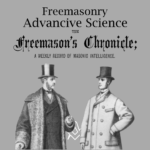 The Freemason's Chronicle - Freemasonry - an Advancive Science Is Freemasonry - an Advancive Science ? Not to confuse advancement with innovation. Has it been the case that Freemasonry's survival for 300 years plus is due to being an Advancive Science, tending to advance. First published in The Freemason's Chronicle 18 September 1875, addresses the same challenges then as now. |
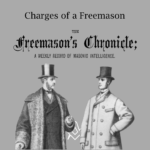 The Freemason's Chronicle - Charges Of A Freemason An interpretation of the "Charges of a Freemason", written Bro. Cornelius Moore and published in 1875, that introduce certain opinions that for some readers, will not sit well in contemporary times. - The Freemason's Chronicle, Sept. 11, 1875 |
 On The Order Of The Temple And Its Doctrine. THE Order of the Temple is divided into two great classes, denominated respectively the Order of the Temple and the Eastern Order. The Eastern Order gave birth to the Order of the Temple, and in the course of time has become an appendage of the latter. It is in ancient Egypt that we find the cradle of the Eastern Order. The Freemason's Chronicle, Sept. 4, 1875 |
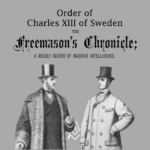 Order of Charles XIII of Sweden The following translation of the Manifesto of King JL Charles XIII of Sweden, on the occasion of his establishing the Masonic Order which bears his name, and of the Statutes of the said Order, may be interesting to our readers. The Freemason's Chronicle, Aug. 28, 1875 |
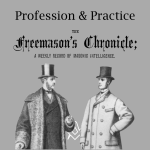 Most of our readers in the course of their experience, have doubtless met with enthusiastic brethren who take it for granted that a Mason can do no wrong. These enthusiasts are thoroughly convinced that the vast majority of those who join the Order are the most benevolent, the most moral, and the very noblest members of society. - The Freemason's Chronicle 10 July 1875 |
 An article investigating the relationship between masonry and citizenship. Are the principles of Freemasonry aligned with the freemason's claim to be a better citizen of the world? The Freemason's Chronicle - 19 June 1875 |
 A visitor must make clear his identity to the satisfaction of the Lodge he proposes to visit. More than once have we been asked to explain our views as to the reception of strangers in a Lodge. - The Freemason's Chronicle - 29 May 1875 |
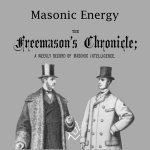 Is there reason in the accusation that Masonic energy looks only to a course of good feeds, when we can point to such grand results as have been achieved in these latter years, both in respect of the extension of our Order ? - 1May 1875 |
 Implementing Freemasonry's peculiar system of morality in our day to day business affairs was the topic of this article, Commercial Integrity, first published in The Freemason's Chronicle - 8 May 1875 |
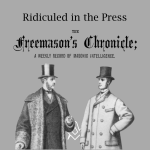 Ridicule has been somewhat illogically described as the test of truth. If it were so, Freemasonry ought to have perished long since. Two press reports from May 1875 covering the |
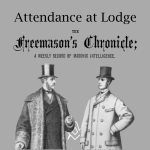 There are many things which Freemasonry will do for a man in the way of opening his mind and giving him larger and kindlier views of life, but Freemasonry itself, cannot eradicate the natural bias of the disposition. |
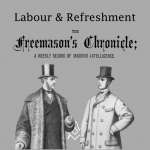 There is, we fear, too marked a tendency in very many Lodges to hasten through its labours, with a view to entering, as soon as possible, upon the business of refreshment. - The Freemason's Chronicle 17th April, 1875 |
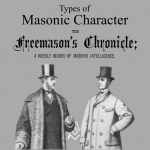 Another example that demonstrates that nothing really changes in Freemasonry. In an article the Types of Masonic Character published 145 years ago in The Freemason's Chronicle 10th April, 1875 |
 A brief history on the relationship between the British Monarchy and the craft - The Freemason's Chronicle 20th March , 1875 |
 What are the qualities of a convivial man and how does this dovetail perfectly in to Freemasonry ? 16th March, 1875 |
 A review of the "Sketch for the History of the Dionysian Artificers," a fragment, by Hyppoli to Joseph Da Costa - This little work may be regarded as, so to speak, the Holy Grail of Masonry. |
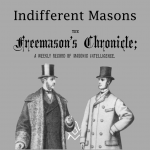 Nothing really changes, an article Indifferent Masons, From Le Monde Maçonnique 1874. Translation published in The Freemason's Chronicle 20th February, 1875 |
 In handling an intruder in the lodge, we endeavoured to show that a good Mason should be a gentleman, and a sincere man. The Freemason's Chronicle 20th February, 1875 |
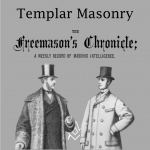 Templar Masonry - a historical aspect of the Religious and Military Order of the Temple published in The Freemason's Chronicle 13th February, 1875 |
 Secrecy perhaps the strongest objection urged by the enemies of the Masonic Order against its existence published in The Freemason's Chronicle 20th March 1875 |
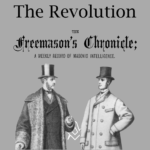 Freemasonry In The United States during And After The Revolution We take a look at Freemasonry in the United States during and after the Revolution first published in The Freemason's Chronicle - February 6, 1875 |
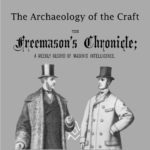 We take a look at the archaeological connection with the Craft, first published in The Freemason's Chronicle - January 30, 1875 |
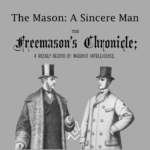 What it means to a Freemason to be a sincere man. Extract: first published in The Freemason's Chronicle - January 23, 1875 |
 What it means to a Freemason to be a citizen of the world ? First published in The Freemason's Chronicle - January 16, 1875 |
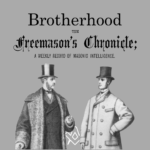 Brotherhood! In that one word what sympathetic associations arise. First published in The Freemason's Chronicle - January 9, 1875 |
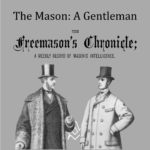 This opening article was written 145 years ago, yet it resonates with Freemasons today as it did then. First published in The Freemason's Chronicle, January 2, 1875, Issue 1 |
masonic knowledge
to be a better citizen of the world
share the square with two brothers

click image to open email app on mobile device









